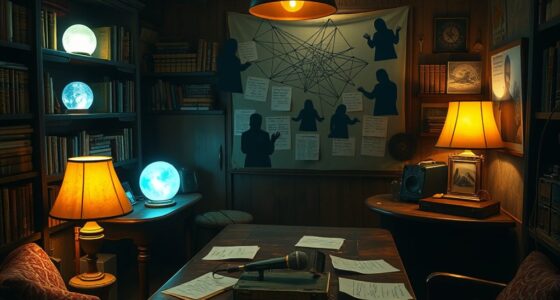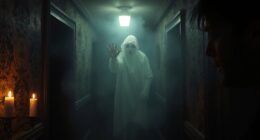To encourage skeptical thinking in paranormal audiences, start by helping them recognize common cognitive biases like pattern-seeking and confirmation bias, which distort their perception of evidence. Teach them to evaluate stories critically, question source motives, and distinguish personal anecdotes from scientific evidence. Promote understanding of scientific principles such as hypothesis testing and reproducibility. By fostering curiosity alongside careful scrutiny and pointing out logical fallacies, you’ll guide them toward more rational, evidence-based perspectives—if you continue, you’ll discover even more effective approaches.
Key Takeaways
- Promote awareness of cognitive biases and differentiate anecdotal from scientific evidence to foster critical evaluation.
- Teach logical fallacy recognition to enhance skepticism and prevent acceptance of flawed arguments.
- Encourage questioning source credibility and motives behind paranormal claims to develop healthy skepticism.
- Foster curiosity balanced with evidence-based reasoning through scientific principles like reproducibility and control groups.
- Advocate respectful, open-minded inquiry that combines curiosity with critical thinking for rational discourse.
Recognizing Cognitive Biases in Paranormal Claims

Cognitive biases often influence how people interpret paranormal claims, making it easier to accept unlikely explanations without question. You might notice that your brain seeks patterns even when none exist, leading you to see faces or figures in random shadows. Confirmation bias can cause you to focus only on evidence that supports paranormal ideas, ignoring contradictory information. The availability heuristic makes dramatic stories seem more credible because they’re memorable, skewing your judgment. Also, emotional reactions like fear or excitement can cloud your objectivity, pushing you to believe in supernatural explanations. Recognizing these biases helps you understand why paranormal claims often seem convincing, even when lacking solid evidence. Being aware of your cognitive tendencies is the first step toward more critical, skeptical thinking. Additionally, understanding how auditory processing challenges can distort perceptions may help you better evaluate the credibility of auditory-based paranormal accounts.
The Importance of Evidence-Based Evaluation

Understanding how your mind can be influenced by biases highlights the importance of evaluating paranormal claims carefully. To do this effectively, rely on evidence rather than anecdotal stories or emotional reactions. Evidence-based evaluation involves examining the available data critically and objectively. You should:
- Look for reproducible results from credible sources
- Prioritize scientific explanations over sensational stories
- Question the methods used to gather evidence
- Assess the credibility of witnesses and sources
- Be wary of confirmation bias influencing your interpretation
- Recognize how cognitive biases can distort perception and judgment
Questioning Sources and Motivations Behind Stories
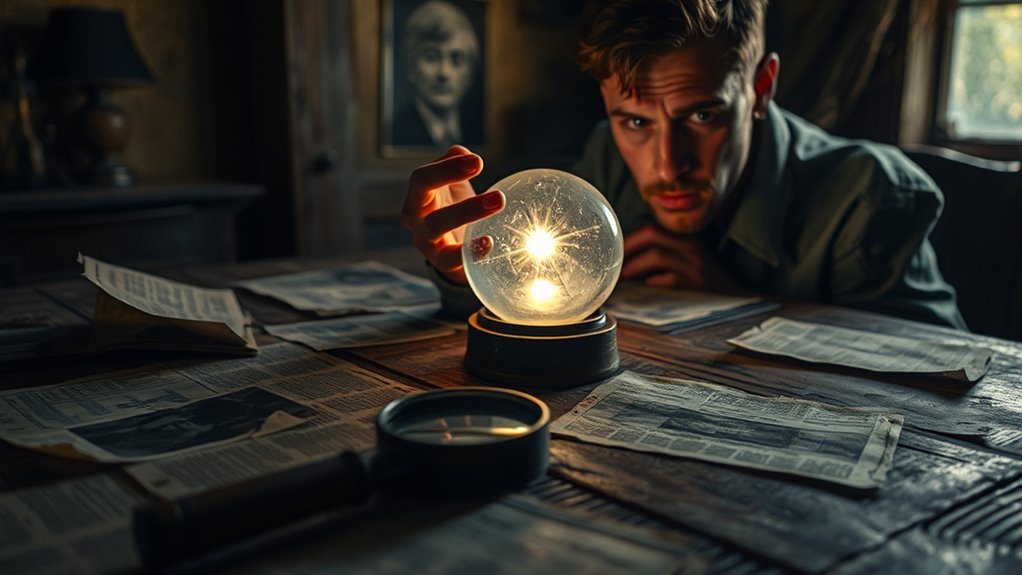
When evaluating paranormal stories, it’s essential to take into account who is sharing them and what their motives might be. Consider whether the storyteller has a reason to exaggerate or mislead, such as financial gain, fame, or personal beliefs. Sometimes, stories are shaped by misunderstandings, false memories, or the desire to entertain. Ask yourself what evidence supports the story and whether the source has a history of credibility. Be wary of stories that rely on anonymous witnesses or lack verifiable details. Recognizing potential biases helps you avoid accepting claims at face value. By questioning why and how a story is told, you develop a more skeptical mindset and avoid falling prey to misinformation or sensationalism.
Developing Critical Thinking Skills for Skepticism

To develop your critical thinking skills, you need to learn how to question assumptions clearly and directly. Analyzing evidence critically helps you identify biases and inconsistencies in paranormal claims. By practicing these skills, you strengthen your ability to evaluate stories skeptically and make informed judgments. Understanding the horsepower of electric dirt bikes can serve as a useful analogy for assessing the power and credibility of paranormal assertions.
Questioning Assumptions Effectively
Questioning assumptions is a crucial step in developing critical thinking skills, especially when evaluating paranormal claims. To do this effectively, you need to identify underlying beliefs or biases that influence your judgment. Challenge these by asking yourself if there’s evidence supporting them or if they’re based on anecdote or tradition. Consider alternative explanations before accepting the initial conclusion. Be aware of cognitive biases like confirmation bias or emotional reasoning that can cloud judgment.
Some strategies include:
- Question the source of your assumptions
- Look for evidence contradicting your beliefs
- Recognize personal biases influencing your thinking
- Avoid jumping to conclusions without sufficient data
- Remain open to changing your perspective based on new information
Analyzing Evidence Critically
Developing critical thinking skills for skepticism requires carefully analyzing the evidence behind paranormal claims. You should examine the source, look for potential biases, and assess the methodology used to gather the data. Ask yourself if the evidence is anecdotal or scientifically verified. Consider alternative explanations and look for corroborating evidence from reputable sources. Avoid jumping to conclusions based on emotional reactions or sensational stories. Instead, focus on the quality and consistency of the evidence. Remember, a single piece of questionable evidence isn’t enough to prove a claim. By questioning the reliability, validity, and context of the evidence, you develop a more rational perspective. Practicing this analytical approach helps you distinguish between credible information and misleading or false claims. Additionally, understanding the Bedroom environment and how perceptions can be influenced by surroundings can further aid in evaluating paranormal reports critically.
Differentiating Between Anecdotal and Scientific Evidence

When evaluating claims, you need to consider the nature of the evidence presented. Anecdotal stories may seem convincing but often lack reliability, while scientific validation offers more trustworthy support. Understanding the difference helps you make more informed judgments about paranormal phenomena. Additionally, recognizing the importance of critical thinking skills can further aid in discerning credible information from misleading or false claims.
Nature of Evidence
Understanding the difference between anecdotal and scientific evidence is essential when evaluating paranormal claims. Scientific evidence relies on systematic methods, reproducibility, and objective measurements, whereas anecdotal evidence is based on personal stories or isolated incidents. Recognizing these distinctions helps you avoid pitfalls like confirmation bias or emotional reasoning. Scientific evidence:
- Is gathered through controlled experiments
- Can be independently verified
- Is subject to peer review
- Involves statistical analysis
- Avoids reliance on personal beliefs or memory
In contrast, anecdotes often lack these qualities, making them weaker as proof. While personal stories can be compelling, they don’t establish generalizable facts. Developing a skeptical mindset involves valuing rigorous, reproducible evidence over isolated experiences, ensuring your conclusions are grounded in reliable information.
Reliability of Anecdotes
Anecdotes can seem convincing because they often evoke emotional responses, but their reliability as evidence is limited. Personal stories are subjective and influenced by individual perceptions, memories, and biases. Just because someone claims to have experienced a paranormal event doesn’t mean it’s objectively true. Emotional impact can make anecdotes feel compelling, but it doesn’t establish factual accuracy. Human memory is fallible, and people often unconsciously fill in gaps or interpret events based on beliefs or expectations. Relying solely on anecdotes can lead you to false conclusions, as they lack the scientific rigor needed to verify claims. To truly understand phenomena, it’s essential to seek evidence that can be tested and verified through systematic investigation rather than personal narratives alone. Additionally, understanding Kia Tuning options illustrates how modifications can be influenced by subjective preferences rather than objective performance data.
Scientific Validation Needed
How can we distinguish between personal stories and scientifically validated evidence? The key lies in understanding the difference between anecdotal observations and rigorous research. Scientific validation involves systematic testing, replication, and peer review. To evaluate claims properly, consider:
- Whether the evidence is supported by controlled experiments
- If findings have been replicated independently
- The presence of peer-reviewed studies backing the claims
- The methodology used to gather data
- Consistency with established scientific principles
- The effectiveness of security systems in deterring criminal activity, which can be supported by empirical studies rather than personal anecdotes
Encouraging Open-Minded yet Rational Inquiry
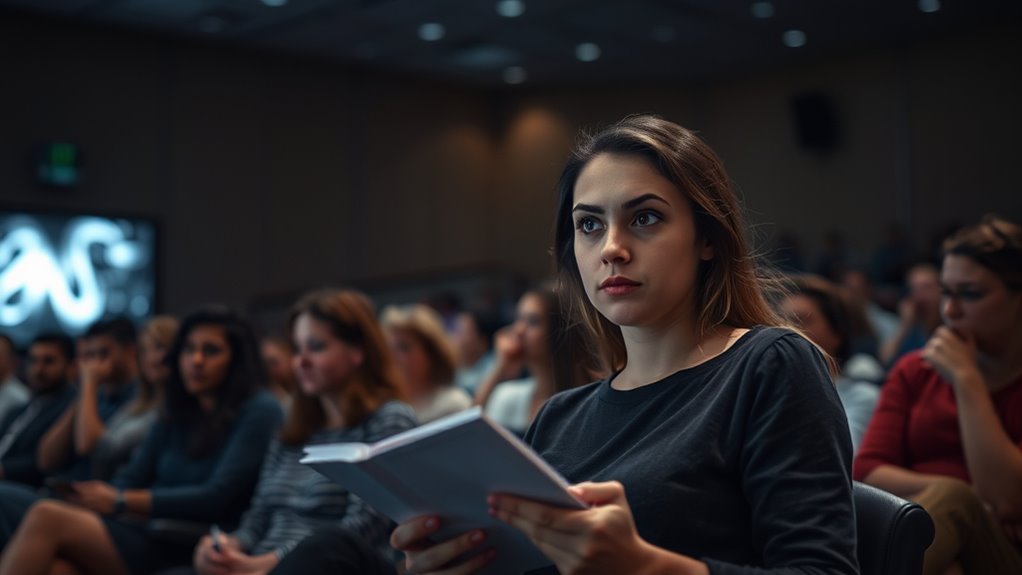
Encouraging open-minded yet rational inquiry requires striking a balance between curiosity and skepticism. You should stay curious about new ideas but avoid accepting claims without evidence. Critical thinking involves questioning assumptions and exploring possibilities while maintaining a rational mindset. To illustrate, consider this table:
| Curiosity | Skepticism | Balance |
|---|---|---|
| Asking questions | Demanding proof | Combining curiosity with evidence-based reasoning |
| Exploring new ideas | Recognizing biases | Staying open but analytical |
| Seeking understanding | Avoiding gullibility | Developing thoughtful skepticism |
Being aware of store hours and how they can influence shopping plans helps in balancing curiosity with practical considerations, ensuring a rational approach to gathering information.
Identifying Logical Fallacies in Paranormal Arguments

While maintaining an open mind is important when exploring paranormal claims, it’s equally essential to recognize the logical pitfalls that can distort reasoning. Detecting fallacies helps you evaluate arguments critically and avoid being misled. Common fallacies include:
- Ad Hominem: Attacking the person rather than their evidence.
- False Dilemma: Presenting only two options when more exist.
- Appeal to Authority: Relying solely on authority figures instead of evidence.
- Post Hoc Ergo Propter Hoc: Assuming causation from mere correlation.
- Anecdotal Evidence: Using personal stories as proof instead of scientific data.
- Recognizing logical fallacies can deepen your understanding of critical thinking principles and improve your ability to discern credible arguments.
Promoting Scientific Literacy and Methodology
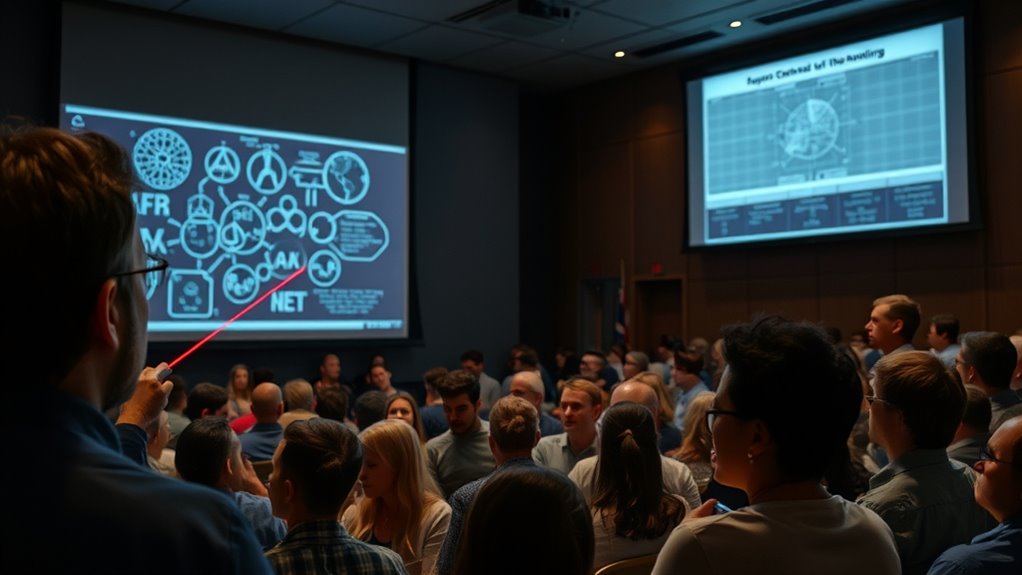
Developing scientific literacy is essential for critically evaluating paranormal claims. When you understand scientific principles and methods, you can better distinguish between credible evidence and misleading information. Learning how scientific investigations are conducted helps you recognize well-supported conclusions versus anecdotal stories or biased reports. Familiarity with concepts like hypothesis testing, control groups, and reproducibility empowers you to question extraordinary claims thoroughly. It also encourages you to seek evidence-based explanations rather than accepting assertions at face value. By cultivating an appreciation for empirical evidence and scientific reasoning, you become less susceptible to pseudoscience and more capable of engaging in rational discussions. Understanding the scientific methodology behind research aids in identifying credible sources and evaluating the reliability of claims. Promoting scientific literacy builds a foundation for curiosity, skepticism, and informed judgment, which are vital in steering through the complex landscape of paranormal claims.
Fostering Respectful Skepticism and Curious Exploration
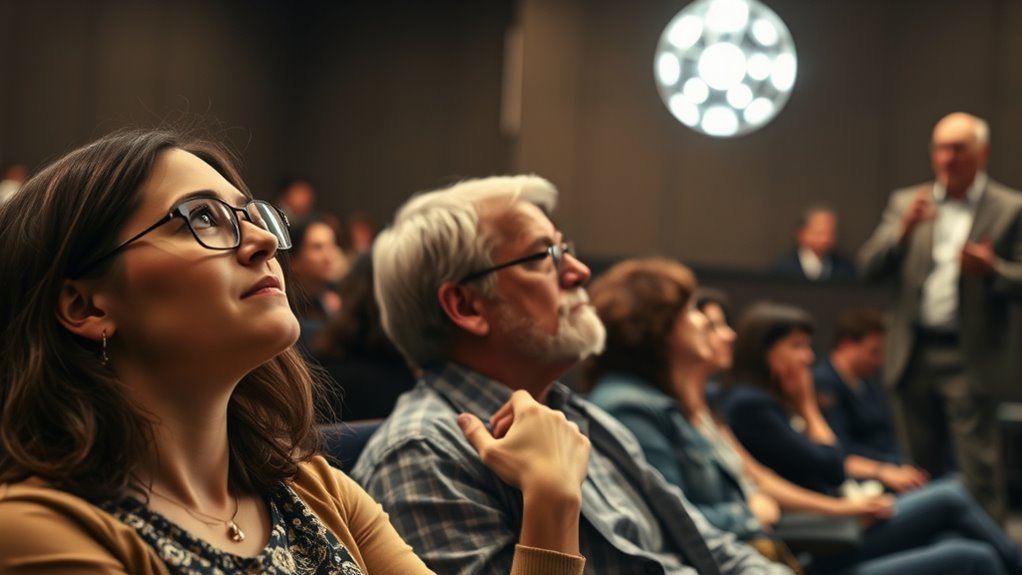
Fostering respectful skepticism and curious exploration involves approaching paranormal claims with an open mind while maintaining a critical perspective. You should question assertions without dismissing them outright, encouraging thoughtful inquiry. This balance helps you avoid bias and fosters genuine understanding. To cultivate this mindset, consider these approaches:
Approach paranormal claims with open-minded curiosity and critical thinking for genuine understanding.
- Engage in active listening to understand different viewpoints.
- Ask open-ended questions to explore underlying evidence.
- Recognize emotional reactions without letting them dominate your judgment.
- Differentiate between healthy curiosity and unwarranted skepticism.
- Respect others’ beliefs while maintaining scientific integrity.
Frequently Asked Questions
How Can I Identify Biases in Paranormal Stories?
You can identify biases in paranormal stories by questioning the source’s credibility and looking for emotional language or confirmation bias. Pay attention to whether the story relies on anecdotal evidence or lacks scientific backing. Consider alternative explanations and seek out skeptical viewpoints. If you notice the storyteller dismisses doubt or evidence that contradicts their claims, it’s a sign bias may be influencing the story. Stay curious and critical to see through the hype.
What Are Common Logical Fallacies in Paranormal Debates?
Did you know that about 80% of paranormal claims rely on anecdotal evidence? In debates, you often see logical fallacies like false dichotomies, where only two options are presented, or appeals to emotion, which sway opinions without facts. Be aware of these tricks, question assumptions, and ask for concrete evidence. Recognizing these fallacies helps you think critically and avoid being misled by unsubstantiated paranormal stories.
How Does Scientific Methodology Differ From Anecdotal Evidence?
Scientific methodology relies on systematic procedures, such as forming hypotheses, conducting controlled experiments, and analyzing data objectively. You can test ideas repeatedly to verify results. Anecdotal evidence, on the other hand, depends on personal stories or individual experiences, which can be biased or unreliable. You should prioritize scientific methods because they provide consistent, measurable, and reproducible evidence, unlike anecdotal accounts that lack rigorous validation.
Why Is Skepticism Important in Evaluating Paranormal Claims?
Skepticism acts as a lighthouse in the fog of paranormal claims, guiding you away from falsehoods and toward clarity. It’s essential because it keeps your mind from getting swept away by sensational stories and encourages you to demand evidence. When you question, you turn the spotlight on the truth, separating fact from fiction. This critical approach helps you navigate the murky waters of the paranormal with a clear, discerning eye.
How Can I Balance Open-Mindedness With Critical Analysis?
You should stay open-minded by listening to different perspectives and considering new evidence, but also apply critical analysis by questioning sources and looking for logical consistency. Trust your intuition but verify facts with credible research. Avoid jumping to conclusions, and remember that skepticism isn’t about dismissing everything but about seeking balanced, well-founded explanations. Balancing these approaches helps you explore paranormal claims thoughtfully and responsibly.
Conclusion
By honing your critical thinking skills, you can navigate paranormal claims like a steady ship amid stormy seas. Recognize biases, question motives, and differentiate between stories and science. Stay open-minded yet rational—like a detective piecing together clues. Encouraging respectful skepticism helps you explore mysteries without falling for falsehoods. Remember, your curiosity fuels discovery, but clarity and evidence keep you grounded on the path to understanding.


